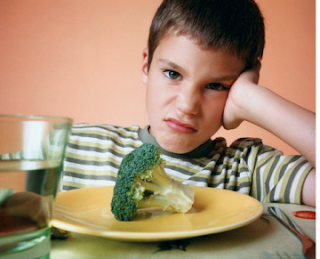NB
Commentary:
Now
this amazing fact came across my desk today. Who knew? I was just speaking to
a friend of mind the other day whose son always cried out when served broccoli
for dinner.
"I
don't wanna eat trees for dinner!" LOL
I can
surely say it was the bane of his existence. But now some 30 years later, he
is a strict vegetarian and has gotten his mother into better health because of
his interest in changing his dietary habits and sharing the benefits of it
with her. So Bravo to him for making such a transformation and finding out
that "trees are absolutely okay to have for dinner!"
http://letsbraw.blogspot.com/2012/09/hate-it-or-love-it-broccoli-is-super.html
Did
You Know That Broccoli is a Man-made Food?
There
is No Such Thing as Wild Broccoli
Broccoli
is a human innovation, a man-made food, and a result of a mutation selected
and cultivated by man throughout history. Known for its green hue and
resemblance to a tiny tree, broccoli has been the bane of kid’s existence
since it was first introduced in the Mediterranean almost 1,000 years
ago. Broccoli is a result of the selective breeding of wild cabbage
plants starting around the 6th century BC. Its name, from the Italian broccolo, relates to the flowering
top of a cabbage – a tribute to its heritage. Since the Roman Empire,
broccoli has been regarded a valuable man-made food and source of nutrition
among the people of Italy and was eventually introduced to England and America
in the 1700s. It took until the 1920s for broccoli to gain in popularity in
the United States.
How
Broccoli was Bred
Start
with a wild cabbage. Wild cabbage has small flowering buds, but only flowers
every other year. By controlling the environment, perhaps in a greenhouse of
sorts, a horticulturist (or even a very patient veggie lover) can make the
wild plant to reproduce itself many times, each time selecting the resulting
plant that has the most desirable qualities and simply discarding the rest.
For broccoli, the selected traits were likely larger, tastier buds. This
selection process was a lengthy one that spanned over many years before the
vegetable began to resemble our modern quintessential green vegetable.
Further evidence of how far broccoli has come are
vegetables like cauliflower, kohlrabi, brussel sprouts, kale, even the
modern form of cabbage available at grocery stores. Each of these seemingly
distinct vegetables were also bred from wild cabbage and did not occur as wild
plants before. They can each be considered a man-made food. Broccoli even has three varieties itself! Have you seen the fancier, more delicate broccolini?
But
Don’t Worry, Broccoli is not a GMO
Broccoli
may be a man-made food, but it is not considered a GMO. Genetically modified
organisms (also known as GMOs) are food plants that have been produced from
organisms in which specific changes were introduced into their DNA through
genetic engineering. Such engineering has allowed for the introduction of new
desired traits to crops such as resistance to pesticides, and has also allowed
for better control over the plant’s genetic structure. While this modification
process may sound like the one described above, the key to GMOs and their
controversies is the genetic engineering – the meddling in the plant’s DNA.
Broccoli and its other cabbage family relatives, on the other hand, were
developed from selective breeding techniques in which the desired traits were
naturally occurring, even if they were considered anomalies. So while broccoli
is a man-made food, nature assisted in its creation. So go ahead, eat up. Just
don’t expect to find some wild broccoli on your next camping trip!
For more information on the roots of broccoli and other
man-made food, see this article on Brassica oleracea.




No comments:
Post a Comment
Thanks for your comment. Peace, NB